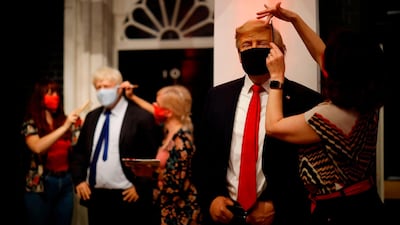As the world braces itself for multiple new outbreaks of Covid-19, some countries are wrapped up in bitter wrangling over whether people should wear a mask or not.
Until now, the most well-known critic of mask-wearing was the US President Donald Trump. He recently changed his mind, however, and emailed his supporters saying that wearing a mask was "something we should all try to do". It could be that Mr Trump has seen the light or it could be lip service to boost his poll numbers, which were not helped by his rejection of masks.
His antipathy towards wearing one though comes as no surprise. Men who identify as "tough" are more likely to respond negatively to wearing masks, according to a study last month titled Toxic Mask-ulinity: The link between masculine toughness and affective reactions to mask wearing in the Covid-19 era published by Susquehanna University in Pennsylvania, US.
According to the report, even when predictors such as partisanship and ideology were taken into account, men who embraced masculine norms of toughness didn't like wearing masks. How they appear to the outside world and what it says about them were important factors.
These men have an idea that a man should be tough, to prove which they needed to present themselves without a mask. Wearing one would imply having succumbed to fearmongering. Worse, it might mean they were actually scared. But the truth is that body image for men is a powerful determinant of self-esteem, emotional life and behaviour.
When it comes to such complex issues, the emotional and physical toll for both men and women can be just as heavy – even if they manifest differently. Given this fact, the issue of men's doubts about how their bodies look should be discussed openly. But what makes it worse for boys and men is that more often than not, they can’t talk about these things. To do so would again contradict established notions of masculinity and toughness – and add to that the popular belief that men aren’t supposed to worry about their looks.
The pressures of body image on boys set in very young. In a study by Credos, the think tank for the advertising industry in the UK, 55 per cent of boys aged eight to 18 said they would consider changing their diet to look better and 23 per cent said they believed there was a perfect male body to strive for. The biggest sources of pressure were friends, social media, advertisements and celebrities.
It is a good thing that now even male celebrities are talking about the emotional suffering they have experienced in trying to live up to image expectations that face boys and men.
Last month, actor Zac Efron caused a stir when he started talking about his unhappy relationship with food on a Netflix travel show. He has spoken previously about how his ripped physique, seen in the Baywatch film, is an unrealistic goal for most people. In last month's show, he became emotional while eating pasta in Italy, explaining that he had held himself back from eating carbohydrates for six months during the filming of Baywatch. People responded saying that they had deprived themselves in similar ways and were glad he was speaking out.
According to a study by Common Sense Media on Children, Teens, Media and Body Image, approximately a third of boys aged six to eight indicate that their ideal body weight is less than their current weight. They want to be leaner and stronger even if this comes at an unrealistic cost. Reinforcing the myth of a socially acceptable physique, one has only to look at recent superhero films that assert notions of the ideal body for men. Trying to look like a superhero is no easy task for boys. And there are constant new pressures. Make-up brands, such as Chanel, Tom Ford and Fenty, are rolling out lines for men as they try to get a piece of the male personal care market. According to Allied Market research this will be worth $166 billion in 2022.
To discuss women and body image issues, an equally troublesome topic, is not new. And it is heartbreaking that increasingly boys also carry these burdens and at such young ages, affected by images in popular culture and the pressures all around to conform to some ideal of masculinity. What's more problematic is that we don’t talk about this enough. Boys themselves are reluctant to raise these matters. So if we don’t start talking about them openly and give them tools to understand and fight these complexes, they will continue to suffer in silence. And some will, dangerously, stick to notions that not wearing a mask is somehow at odds with masculinity.
Shelina Janmohamed is the author of Love in a Headscarf and Generation M: Young Muslims Changing the World




